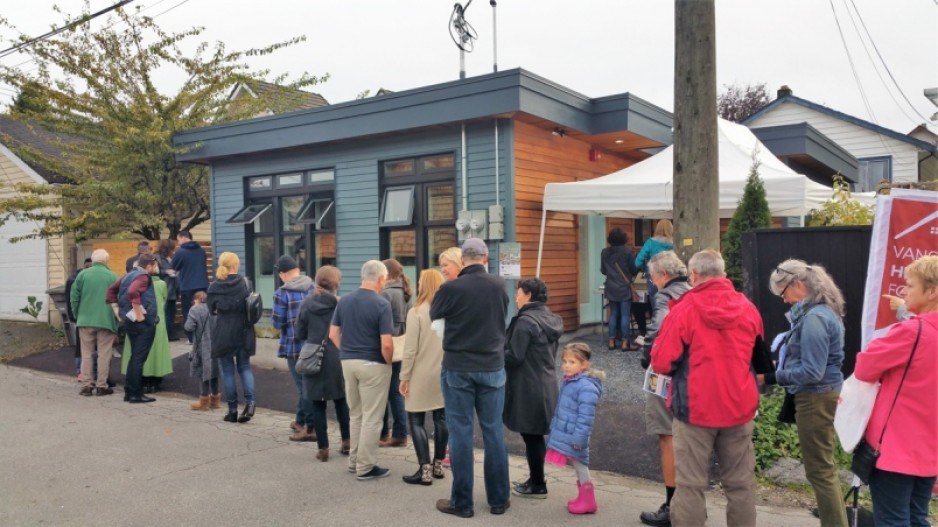A push by Metro Vancouver municipalities to increase rental density in single-family neighbourhoods could soon collide with tougher enforcement of the capital gains tax exemption on principal residences, tax and real estate experts say.
Vancouver, North Vancouver, Coquitlam and Port Moody are among the municipalities that now or will soon allow from two to four rental suites to be contained on a detached housing lot, through rental suites and laneway houses.
The move is meant to increase the rental inventory through low-impact density and allow house owners to tap rental income to support mortgage payments on the most expensive housing in Canada.
But in 2017, Canada Revenue Agency (CRA), for the first time, will require the reporting of sales information on principal residences, which are exempt from capital gains taxation. However, the portion of a principal residence lot, such as detached laneway house, used to generate rental income could be subject to capital gains taxation when the property is eventually sold.
As an example, the City of North Vancouver now allows two rental units, including a laneway house, on single-family detached lots. In Vancouver, a proposed city-wide zoning change could allow older houses to be converted into multiple rental units and allow a laneway house on the same lot, which may even be allowed to be sold as a strata unit.
If CRA interprets the principal residence exemption to exclude some or all if the rental portion, a house owner could be subject to capital gains tax when the house is sold.
Capital gains relate to the gain in value of a property and, according to the Real Estate Board of Greater Vancouver (REBGV), the typical detached house in Vancouver has increased in value by 112% in the past 10 years and by an average of 140% in the city of Vancouver.
A Vancouver house with a laneway home and two other rental units, valued at a total of $3.6 million – the current benchmark detached house price on Vancouver’s west side – could be subject to capital gains taxation on $1 million if the regulations are strictly enforced.
“If we assume the taxpayer is at the top marginal rates payable in B.C. of $200,001 and over, the marginal tax rate will be 23.85%, so the taxes would be $238,500 on a $1 million capital gain,” explained William Cooper, a tax lawyer with Boughton Law in Vancouver.
Cooper said CRA’s closer look at principal residence taxation goes beyond foreign speculators.
“The principal residence exemption is one of the biggest tax loopholes in the history of the Canadian Income Tax Act. It has likely resulted in billions of dollars in lost tax revenues. Ordinary taxpayers played fast and loose with the reporting of taxable gains on the sale of their residences,” he said.
No reporting of a sale of a principal residence was required by the CRA until the changes were announced in October 2016.
“While this change was justified on the grounds of abuse by foreigners, the real problem was with house flippers, estates and rental properties owned by everyday Canadians that did not fully qualify for the principal residence exemption and were never reported,” Cooper explained.
Other real estate and tax professionals note that rental property has always been subject to capital gains taxation and that house owners would have little legal recourse in claiming a primary rental as a principal residence.
“You can’t argue that the government is finally enforcing the law,” said Elton Ash, Kelowna-based vice-president of Western Canada for Re/Max.
While the portion of a house being rented out, such as a basement suite, would not necessarily trigger a capital gains tax, detached laneway houses are not so clearly defined.
“When the entire property is eventually sold any gain realized on the laneway house portion will not be eligible for the principal residence exemption,” according to an analysis done for the Canadian Tax Foundation by tax advisor Grant Thornton. “The owner is required to track all costs associated with building the laneway house as well as keep records related to the original cost of the property, capital improvements made, the relative value of the land versus the main residence on the date of the deemed disposition and on the date of sale.”
Vancouver real estate investment consultant Ozzie Jurock noted, “Some house owners may have to weigh whether the rental income they generate is worth the risk of potentially losing a hefty portion of the principal residence exemption.”
Jurock and Thornton provided the same advice as did the City of Vancouver and the City of North Vancouver planning officials: before you start dividing a detached lot into a money-spinning rental property, contact a professional tax adviser.




